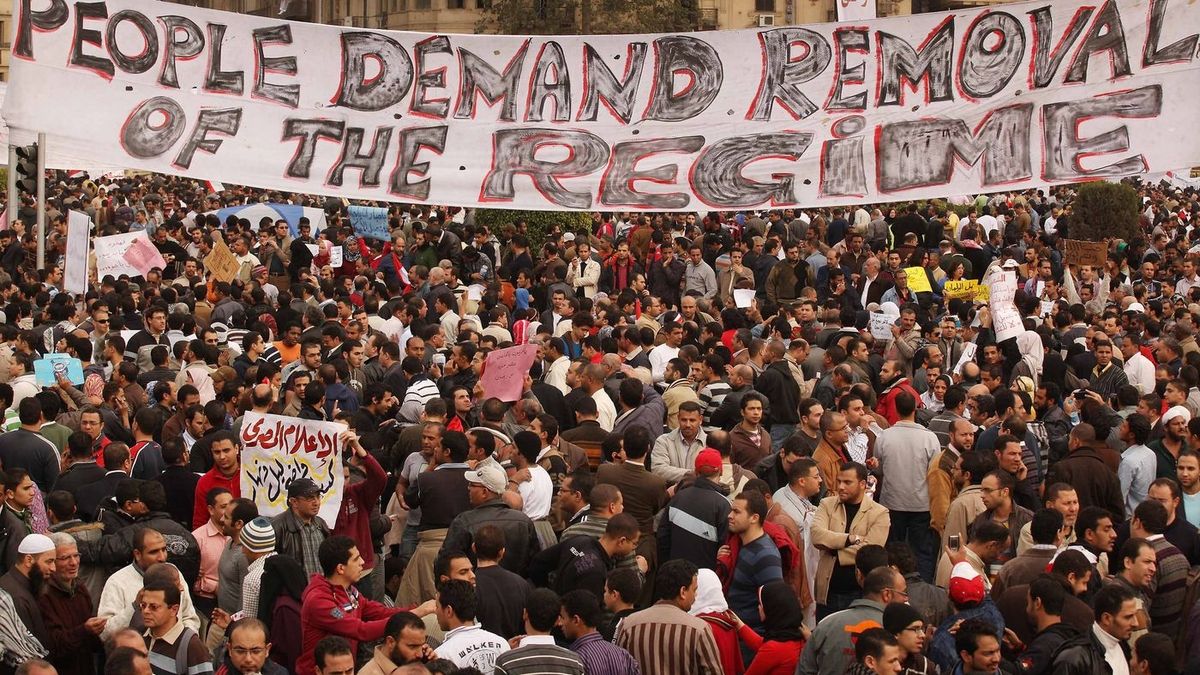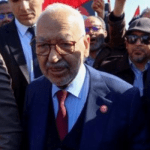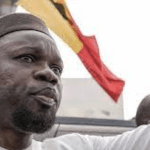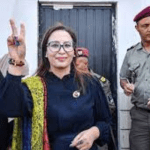A key figure in Tunisia’s opposition and leader of the Ennahda party, Rached Ghannouchi, has gone on hunger strike in solidarity with other anti-government demonstrators.
The move is a form of protest against the ongoing arrest of opposition figures, according to a team of lawyers representing the opposition.
Ghannouchi, 82, has long been an outspoken critic of President Kais Saied and his administration. He was arrested last year on charges of provocation against police and alleged involvement in anti-state security conspiracies.
In a statement issued by his legal team, Ghannouchi urged Tunisians to respect democratic norms, underlining the need of liberty and judicial autonomy.
Despite his hunger strike, he is still committed to campaigning for a democratic Tunisia that includes all of its residents.

The opposition has sharply criticized President Saied’s activities, particularly his decision to dismiss the elected parliament in 2021, which they see as a coup. Saied, on the other hand, defends his actions as vital steps toward restoring Tunisia’s stability following years of political turbulence.
Last week, six other opposition leaders initiated an indefinite hunger strike to demand their release from detention without trial.
They have also called for an end to judicial harassment of political activists, journalists, and civil society members.
The detained leaders, including Jawher Ben Mbarak, Khayam Turki, Ghazi Chaouachi, Issam Chabbi, Abdelhamid Jalasi, and Rida Belhaj, were arrested on suspicion of plotting against state security.
The opposition accuses President Saied of suppressing press freedom and undermining democratic institutions through his constitutional reforms. Saied, however, maintains that his actions are necessary to protect Tunisia from instability.
A key figure in Tunisia’s opposition and leader of the Ennahda party, Rached Ghannouchi, has gone on hunger strike in solidarity with other anti-government demonstrators.
The move is a form of protest against the ongoing arrest of opposition figures, according to a team of lawyers representing the opposition.
Ghannouchi, 82, has long been an outspoken critic of President Kais Saied and his administration. He was arrested last year on charges of provocation against police and alleged involvement in anti-state security conspiracies.
In a statement issued by his legal team, Ghannouchi urged Tunisians to respect democratic norms, underlining the need of liberty and judicial autonomy.
Despite his hunger strike, he is still committed to campaigning for a democratic Tunisia that includes all of its residents.

The opposition has sharply criticized President Saied’s activities, particularly his decision to dismiss the elected parliament in 2021, which they see as a coup. Saied, on the other hand, defends his actions as vital steps toward restoring Tunisia’s stability following years of political turbulence.
Last week, six other opposition leaders initiated an indefinite hunger strike to demand their release from detention without trial.
They have also called for an end to judicial harassment of political activists, journalists, and civil society members.
The detained leaders, including Jawher Ben Mbarak, Khayam Turki, Ghazi Chaouachi, Issam Chabbi, Abdelhamid Jalasi, and Rida Belhaj, were arrested on suspicion of plotting against state security.
The opposition accuses President Saied of suppressing press freedom and undermining democratic institutions through his constitutional reforms. Saied, however, maintains that his actions are necessary to protect Tunisia from instability.
A key figure in Tunisia’s opposition and leader of the Ennahda party, Rached Ghannouchi, has gone on hunger strike in solidarity with other anti-government demonstrators.
The move is a form of protest against the ongoing arrest of opposition figures, according to a team of lawyers representing the opposition.
Ghannouchi, 82, has long been an outspoken critic of President Kais Saied and his administration. He was arrested last year on charges of provocation against police and alleged involvement in anti-state security conspiracies.
In a statement issued by his legal team, Ghannouchi urged Tunisians to respect democratic norms, underlining the need of liberty and judicial autonomy.
Despite his hunger strike, he is still committed to campaigning for a democratic Tunisia that includes all of its residents.

The opposition has sharply criticized President Saied’s activities, particularly his decision to dismiss the elected parliament in 2021, which they see as a coup. Saied, on the other hand, defends his actions as vital steps toward restoring Tunisia’s stability following years of political turbulence.
Last week, six other opposition leaders initiated an indefinite hunger strike to demand their release from detention without trial.
They have also called for an end to judicial harassment of political activists, journalists, and civil society members.
The detained leaders, including Jawher Ben Mbarak, Khayam Turki, Ghazi Chaouachi, Issam Chabbi, Abdelhamid Jalasi, and Rida Belhaj, were arrested on suspicion of plotting against state security.
The opposition accuses President Saied of suppressing press freedom and undermining democratic institutions through his constitutional reforms. Saied, however, maintains that his actions are necessary to protect Tunisia from instability.
A key figure in Tunisia’s opposition and leader of the Ennahda party, Rached Ghannouchi, has gone on hunger strike in solidarity with other anti-government demonstrators.
The move is a form of protest against the ongoing arrest of opposition figures, according to a team of lawyers representing the opposition.
Ghannouchi, 82, has long been an outspoken critic of President Kais Saied and his administration. He was arrested last year on charges of provocation against police and alleged involvement in anti-state security conspiracies.
In a statement issued by his legal team, Ghannouchi urged Tunisians to respect democratic norms, underlining the need of liberty and judicial autonomy.
Despite his hunger strike, he is still committed to campaigning for a democratic Tunisia that includes all of its residents.

The opposition has sharply criticized President Saied’s activities, particularly his decision to dismiss the elected parliament in 2021, which they see as a coup. Saied, on the other hand, defends his actions as vital steps toward restoring Tunisia’s stability following years of political turbulence.
Last week, six other opposition leaders initiated an indefinite hunger strike to demand their release from detention without trial.
They have also called for an end to judicial harassment of political activists, journalists, and civil society members.
The detained leaders, including Jawher Ben Mbarak, Khayam Turki, Ghazi Chaouachi, Issam Chabbi, Abdelhamid Jalasi, and Rida Belhaj, were arrested on suspicion of plotting against state security.
The opposition accuses President Saied of suppressing press freedom and undermining democratic institutions through his constitutional reforms. Saied, however, maintains that his actions are necessary to protect Tunisia from instability.
A key figure in Tunisia’s opposition and leader of the Ennahda party, Rached Ghannouchi, has gone on hunger strike in solidarity with other anti-government demonstrators.
The move is a form of protest against the ongoing arrest of opposition figures, according to a team of lawyers representing the opposition.
Ghannouchi, 82, has long been an outspoken critic of President Kais Saied and his administration. He was arrested last year on charges of provocation against police and alleged involvement in anti-state security conspiracies.
In a statement issued by his legal team, Ghannouchi urged Tunisians to respect democratic norms, underlining the need of liberty and judicial autonomy.
Despite his hunger strike, he is still committed to campaigning for a democratic Tunisia that includes all of its residents.

The opposition has sharply criticized President Saied’s activities, particularly his decision to dismiss the elected parliament in 2021, which they see as a coup. Saied, on the other hand, defends his actions as vital steps toward restoring Tunisia’s stability following years of political turbulence.
Last week, six other opposition leaders initiated an indefinite hunger strike to demand their release from detention without trial.
They have also called for an end to judicial harassment of political activists, journalists, and civil society members.
The detained leaders, including Jawher Ben Mbarak, Khayam Turki, Ghazi Chaouachi, Issam Chabbi, Abdelhamid Jalasi, and Rida Belhaj, were arrested on suspicion of plotting against state security.
The opposition accuses President Saied of suppressing press freedom and undermining democratic institutions through his constitutional reforms. Saied, however, maintains that his actions are necessary to protect Tunisia from instability.
A key figure in Tunisia’s opposition and leader of the Ennahda party, Rached Ghannouchi, has gone on hunger strike in solidarity with other anti-government demonstrators.
The move is a form of protest against the ongoing arrest of opposition figures, according to a team of lawyers representing the opposition.
Ghannouchi, 82, has long been an outspoken critic of President Kais Saied and his administration. He was arrested last year on charges of provocation against police and alleged involvement in anti-state security conspiracies.
In a statement issued by his legal team, Ghannouchi urged Tunisians to respect democratic norms, underlining the need of liberty and judicial autonomy.
Despite his hunger strike, he is still committed to campaigning for a democratic Tunisia that includes all of its residents.

The opposition has sharply criticized President Saied’s activities, particularly his decision to dismiss the elected parliament in 2021, which they see as a coup. Saied, on the other hand, defends his actions as vital steps toward restoring Tunisia’s stability following years of political turbulence.
Last week, six other opposition leaders initiated an indefinite hunger strike to demand their release from detention without trial.
They have also called for an end to judicial harassment of political activists, journalists, and civil society members.
The detained leaders, including Jawher Ben Mbarak, Khayam Turki, Ghazi Chaouachi, Issam Chabbi, Abdelhamid Jalasi, and Rida Belhaj, were arrested on suspicion of plotting against state security.
The opposition accuses President Saied of suppressing press freedom and undermining democratic institutions through his constitutional reforms. Saied, however, maintains that his actions are necessary to protect Tunisia from instability.
A key figure in Tunisia’s opposition and leader of the Ennahda party, Rached Ghannouchi, has gone on hunger strike in solidarity with other anti-government demonstrators.
The move is a form of protest against the ongoing arrest of opposition figures, according to a team of lawyers representing the opposition.
Ghannouchi, 82, has long been an outspoken critic of President Kais Saied and his administration. He was arrested last year on charges of provocation against police and alleged involvement in anti-state security conspiracies.
In a statement issued by his legal team, Ghannouchi urged Tunisians to respect democratic norms, underlining the need of liberty and judicial autonomy.
Despite his hunger strike, he is still committed to campaigning for a democratic Tunisia that includes all of its residents.

The opposition has sharply criticized President Saied’s activities, particularly his decision to dismiss the elected parliament in 2021, which they see as a coup. Saied, on the other hand, defends his actions as vital steps toward restoring Tunisia’s stability following years of political turbulence.
Last week, six other opposition leaders initiated an indefinite hunger strike to demand their release from detention without trial.
They have also called for an end to judicial harassment of political activists, journalists, and civil society members.
The detained leaders, including Jawher Ben Mbarak, Khayam Turki, Ghazi Chaouachi, Issam Chabbi, Abdelhamid Jalasi, and Rida Belhaj, were arrested on suspicion of plotting against state security.
The opposition accuses President Saied of suppressing press freedom and undermining democratic institutions through his constitutional reforms. Saied, however, maintains that his actions are necessary to protect Tunisia from instability.
A key figure in Tunisia’s opposition and leader of the Ennahda party, Rached Ghannouchi, has gone on hunger strike in solidarity with other anti-government demonstrators.
The move is a form of protest against the ongoing arrest of opposition figures, according to a team of lawyers representing the opposition.
Ghannouchi, 82, has long been an outspoken critic of President Kais Saied and his administration. He was arrested last year on charges of provocation against police and alleged involvement in anti-state security conspiracies.
In a statement issued by his legal team, Ghannouchi urged Tunisians to respect democratic norms, underlining the need of liberty and judicial autonomy.
Despite his hunger strike, he is still committed to campaigning for a democratic Tunisia that includes all of its residents.

The opposition has sharply criticized President Saied’s activities, particularly his decision to dismiss the elected parliament in 2021, which they see as a coup. Saied, on the other hand, defends his actions as vital steps toward restoring Tunisia’s stability following years of political turbulence.
Last week, six other opposition leaders initiated an indefinite hunger strike to demand their release from detention without trial.
They have also called for an end to judicial harassment of political activists, journalists, and civil society members.
The detained leaders, including Jawher Ben Mbarak, Khayam Turki, Ghazi Chaouachi, Issam Chabbi, Abdelhamid Jalasi, and Rida Belhaj, were arrested on suspicion of plotting against state security.
The opposition accuses President Saied of suppressing press freedom and undermining democratic institutions through his constitutional reforms. Saied, however, maintains that his actions are necessary to protect Tunisia from instability.














